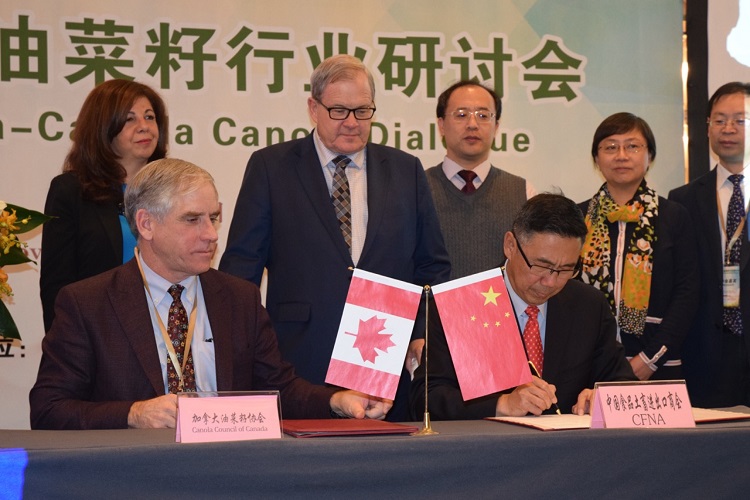MacAulay to Travel to China Again

Lawrence MacAulay is headed to China, again. The federal agriculture minister will visit Shanghai, Qingdao and Beijing during the six-day trip set for Nov. 5-10
by Kelsey Johnson – iPolitics
The trips marks the third time MacAulay will travel to China. He also visited the country in 2016 and 2017. China is Canada’s second-largest trading partner in agriculture and food.
During his visit, MacAulay will “meet with industry and key government officials to discuss trade opportunities and promote Canadian agricultural, agri-food, and fish and seafood products in China,” his office said. He also intends to “build upon and expand relationships with China’s growing e-commerce sector.”
He will also attend several trade shows, including Food & Hotel China, China Fisheries and Seafood Expo, and the China International Import Expo, in an effort to “expand and strengthen business ties.”
“Canada’s agriculture industry has long set its sights on the Asian superpower, particularly for export-dependent industries like canola, pork and beef”
The first two shows are Agriculture and Agri-Food Canada’s flagship trade shows, the minister’s office said. In 2017, the shows produced more than $177 million in on-site and anticipated sales for more than 140 Canadian companies.
Events organized by Canada’s provinces are also planned while MacAulay is in China, his office said.
MacAulay’s latest trip to China comes less than three weeks after China’s agriculture minister, Han Changfu, travelled to Ottawa and Montreal on Oct. 17 for a bilateral visit with his Canadian counterpart. Stops on the visit included a local beef farm, the Olymel hog- and pork-processing facility, and Agriculture and Agri-Food Canada’s Ottawa Research and Development Centre to see crop research.
MacAulay’s visit also wraps up one day before International Trade Minister Jim Carr and Finance Minister Bill Morneau are set to visit Beijing for two days of business meetings starting Nov. 11.
Canada and China’s economic relationship has faced scrutiny in the aftermath of the United States-Mexico-Canada Agreement, which includes a controversial clause that trade experts say will make it difficult for Canada to negotiate a free trade deal with China.
The clause allows any country to withdraw from the deal on six months’ notice if one of the partners starts free trade negotiations with a non-market economy to which they object — widely assumed to be China.
“We oppose to fabricating the concepts of ‘market country’ and ‘non-market country’ outside the framework of WTO, which, in essence, is the excuse made by some countries to shirk their obligations and refuse to meet their international commitments,” the Chinese embassy in Ottawa said in a statement earlier this month.
“This is a dishonest behaviour. We deplore the hegemonic actions taken by some country, which blatantly interferes with other country’s sovereignty,” it continued.
“No matter how other countries adopt trade-restricting actions against China, China will consistently pursue opening-up at its own pace and continuously carry out mutually beneficial and win-win economic and trade co-operation with countries worldwide treating it in an equal-footed and friendly way.”
Appearing before the Senate foreign affairs committee on Thursday, Carr said Canada and China haven’t embarking on formal free trade talks, so, for now, it has nothing to tell its North American partners.
“We will look to deepening and broadening our trading relationships with China, sector by sector. If, at some stage of the game, we enter into a conversation about a full free trade agreement, we will inform our North American partners, as we are obliged to do,” said Carr.
“But it does not constrain us in continuing to deepen our ties with China or any other nation in the world.”
Carr said the clause is “reciprocal” and applies to the U.S. and Mexico, as well. If Canada does enter into free trade talks with China, it will duly inform the North American partners, he added.
“And if our partners don’t like it, they have the capacity to bolt from the agreement, just as they do now.”
Canada and Beijing have been engaged in exploratory trade talks since 2016. Like Carr, Prime Minsiter Justin Trudeau has repeatedly insisted the clause included with the USMCA will not impede Canadian trade with China — a position also reiterated by MacAulay.
Canada’s agriculture industry has long set its sights on the Asian superpower, arguing the country’s fast-growing middle class offers a wealth of economic opportunities, particularly for export-dependent industries like canola, pork and beef.
With files from Marieke Walsh, Canadian Press












